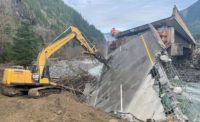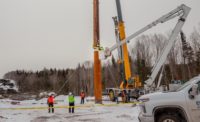Construction Safety
Crane in Fatal Canada Collapse Removed as Union Seeks Safety Changes

Emergency authorities at the site of the July 12 tower crane boom collapse in Kelowna. B.C., lifted an evacuation order for the project area, with no cause yet revealed for the "catastrophic" equipment failure that killed five people.
In a news release, Central Okanagan Emergency Operations said the "site engineer and utility providers have completed their inspections of the area as well." A spokeswoman declined to release further details or respond to queries.
Local authorities in Kelowna, which is about 240 miles east of Vancouver, have so far declined to speculate about the collapse cause, as has the developer, locally based Mission Group. In a July 19 statement, Mission Group said that "any further details [it] can provide are limited while the police, the BC Coroners Service and WorkSafeBC conduct their investigations."
Five people died at the 25-story, 178-unit residential tower in the city's downtown. The accident killed four employees of B.C.-based site contractor Stemmer Construction, and a civil engineer working for a consultant in the damaged adjacent building. That engineer was not linked to the condo project, according to ENR confirmation of information in social media posts.
Stemmer is not responding to questions
A Mission Group spokesman declined ENR’s requests for details on Stemmer’s work history with the developer, status of site debris cleanup, project work resumption or new work protocols resulting from the accident.
In an interview with ENR, Frank Carr, business representative for operating engineers' Union Local 115 in Kamloops, B.C., said that to his knowledge Stemmer was not affiliated with any union.
Carr said operators in general are under intense pressure to both assemble and disassemble cranes as quickly as possible, which he contends can lead to unsafe conditions.
Local 115 has pushed successfully for rules being tested under a pilot program in Vancouver that allow contractors more time to disassemble their cranes, and more space to stage and execute work.
Carr said he would like to see these rules adopted on a local and provincial level. The union is also pushing for new rules that would require certification and training for contractors that specialize in crane assembly and disassembly and develop a registry of individuals working in the field.
“A lot of cities don’t want roads shut down and don’t want the sidewalks closed,” he said.
There are currently 80 tower cranes at work in Vancouver, with another 200 at construction sites across the province, according to the union. “We have been pushing for stronger regulations for two decades,” Carr said. “We don’t want people out there trying to undercut the business and hire people who are not experienced.”





